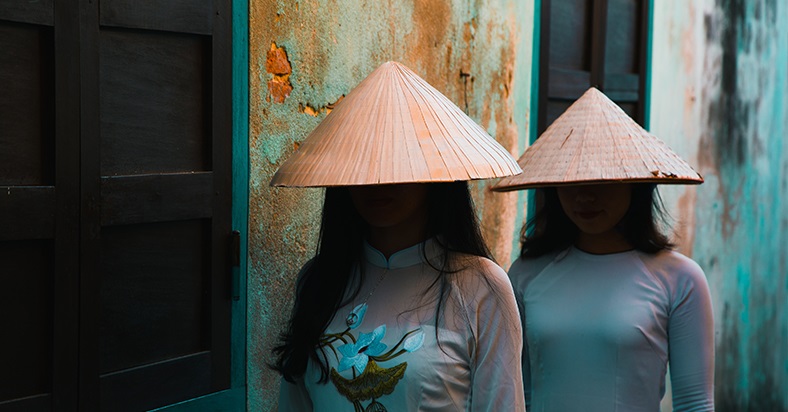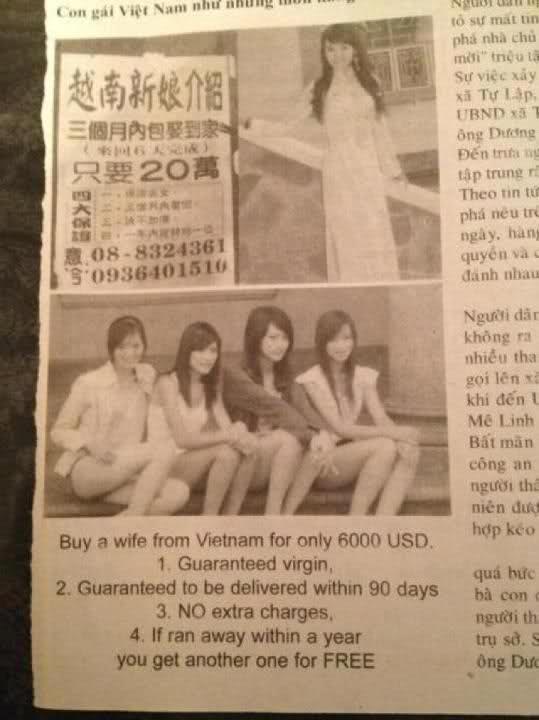
I’ve recently been fascinated with Vietnam and it’s cultural heritage. I’ve been doing a lot of online surfing about it and as I try see what the people are like in that country, I’ve stumbled upon a few stories about the plight of mail-order Vietnamese brides.
As a man from Southeast Asia, the term “mail-order” isn’t something new to me. I’ve seen some of my impoverished countrywomen latch on to foreign men from rich countries, hoping that these men would be able to give them better lives abroad. But these relationships are just that, relationships. Relationships that are based on an appreciation for each other, whatever it may be.
On the other hand, the Vietnamese set up is a lot different and often sadder for the women involved. That’s because they are bought for marriage.
To my knowledge and from what I’ve heard, Vietnamese women are some of the most beautiful and well mannered women in the world. This is why I was shocked to find out that there are illegal matchmakers selling them as “virgin brides” to foreigners as if they’re commodities.
The Women
I do not wish to immediately judge the women or men who agree to this sort of relationship. Who am I to judge? But I am deeply moved by the women’s common response when asked why they agree to this. They say: “to have a better life for myself and help my family”.
These women are often lured by the matchmakers from their rural villages and given promises that they will be introduced to a wealthy foreign man who’ll take care of her and her family. Many of them are simple minded with simple dreams for their future. That is to have their families be well taken cared of and marry a good man who she can raise a family with. There’s nothing wrong with this aspiration, but it can be exploited by those who understands the desperation of these women in poverty.
The standard of living in these poor communities is difficult and access to higher education is not too common especially for women. Although we can take note that Vietnam has a high literacy rate of 94%, as of 2015 according to the CIA’s world factbook, quality jobs are not always guaranteed in developing countries especially in its rural regions. Culturally, women from these regions are still expected to get married at a youthful age and have children while men are prioritized for education and jobs. That is, if those options are even available.
One other factor that makes this an attractive option for these women is how they see the previous generation of women who have also taken this life decision. The previous generation of women who were able to marry a decent foreign man are able to send money back to their families and are then able to build up new homes and are also able to take care of their relatives by this means. The economic impact by the money sent by those women are very visible in their hometowns where the families that they’ve left behind are now able to set up local businesses and have new homes built. They seem to have become more affluent in their local communities thus further legitimizes the idea of a comfortable life with a foreign man. They are viewed as middle-class by local standards.
It’s hard to say that these women are reluctant to marry foreign men under such terms. As I’ve researched more about this trade, some of these women seem to actually favor it. When bought, they do not see themselves being prostituted but rather see the marriage as a practical and wanted solution. Some of these women actually look for a trusted matchmaker or agency themselves to ensure being partnered to good men. They offer themselves not as prostitutes but as real legal wives.
But from what I’ve also found out, not every story of a Vietnamese bride has a good outcome. There have been reports of domestic violence, human trafficking, and other heinous crimes. The business of selling women as brides is of course illegal under Vietnamese and international law. But with loop holes in the laws and lack of government effort, this has steadily become lucrative to human traffickers.
Just in 2017, the Department of State issued the report 2017 Trafficking in Persons Report that puts Vietnam in the TIER 2 rank where it’s acknowledged that Vietnam’s government do not fully comply with an TVPA’s minimum standards, but are making significant efforts to bring themselves into compliance with those standards. This also means that Vietnamese women and children are one of the most trafficked people in the world. But as of 2019, they are now in the TIER 2 Watchlist rank, which means the number of trafficked victims has significantly increased.
There are also other personal aspects that puts these Vietnamese brides in difficult situations such as:
- Culture shock and forced compliance with the foreign husband’s culture and relatives
- language barriers
- inability to practice religious beliefs
- Difficulties in emotional connection between spouses
- treated as property
- Other failed expectations such as the man lied about his job or his status in life before the marriage
- difficulty in seeking immediate help in times of emergency and trouble
- home sickness
Just last month in Yeongam, South Korea, a friend of a Vietnamese woman reported to the police that the woman’s Korean husband physically battered her. It’s not clear if the wife was indeed a purchased bride, but the viral video was a bitter reminder of risks involved in such relationship set ups.

The Matchmakers
Matchmakers, or bride brokers, thrive in mainland Southeast Asia. Selling the idea of being bought as a bride by a rich foreigner to a woman isn’t difficult, especially in rural areas of Indochina. As a matter of fact, we can say that it’s part of tradition. There are laws today that prohibits this but people are still willing to follow through what has already been part of custom.
Vietnam’s government in upholding the prohibiting laws has been very lenient. Corruption isn’t the only possible reason for this. But the fact that it would be difficult and resource exhausting just to prove in court that the marriage is somewhat of a sham makes it less of a priority for authorities. Other than that, authorities do not have a sense of urgency to step into such personal matters especially if it’s about people creating their own definition of “success”. As a man from Southeast Asia, I can definitely vouch that practicality is in our core traits but it’s still important to note that a government’s lack of will can be favorable to thriving criminal networks and activities.
What makes it also difficult for the government to enforce the law are the loopholes. Some bride brokers are able to hide their motives by masquerading as “dating agencies”, which are not illegal. These agencies are even able to assist in weddings, vacation packages, legal paper works, and medical examination with STD check ups. The whole process connects them to other industries that has also become lucrative due to the trade.
Some brokers may tend to focus on a specific rural community. It makes their referrals more credible to the local women if they see that the previous women that they’ve matched to foreign men send money back to their homes and are able to build up new lives for their relatives.
Most matchmakers look for customers from neighboring rich countries like China, Singapore, Taiwan, and South Korea. They try to do extensive background checks about their customers to make sure they are who they say they are.
They also do background checks on the women. They look for women whose ages range from 18 to 25. The younger, the more impressionable and more in demand by the customers. Besides youthfulness, virginity is also a primary selling point that customers look for in a bride. That’s why brokers also assist in virginity examinations in clinics once a customer has chosen the bride he wants.
Depending on the girl’s beauty and the matchmaker’s services, the whole transaction can cost the customer $5,000 up to more than $20,000 (USD).

Of course, there are also matchmakers operating in a much shadier way. There have been victims of quick scheme marriages where the bride is fooled. Some experience being trafficked from one broker to another. Some are exploited into prostitution to pay of debts and cover expenses. Others are fooled by telling them that they are marrying a rich man from a big city, only to find out they’re being sold as a wife to another farmer from a rural village in China. Or unknowingly sold as a wife to a garbage collector from South Korea who first introduced himself as a businessman. And worst of all, there are those women who are unwilling in the first place to be sold off.
Traffickers often prey on young women from mountainous areas close to the border of China. Because their whereabouts are difficult to trace and resources for operations of local authorities are very limited. Many of these trafficked victims don’t even have birth certificates to validate their identity. Once these victims are crossed to the borders, jurisdiction is now China’s and it becomes very difficult to save the girl.
This brings us to another problem that women in this trade can face. Once they’re married off to the foreigner and has finally migrated to the groom’s country, the brokers or agency does not and can not guarantee their safety. Her well being is at the mercy of her husband, perhaps also her in-laws, and the governing laws of that country. If the woman finds herself in trouble, she’s on her own to look for solutions. There is no safety net that these brokers can provide. They often tell the buyers that if they don’t like the girl they’ve married, it’s their problem to send them back home themselves.
The Customer
Most of the buyers of Vietnamese brides are also Asian men coming from East Asia and some Southeast Asian countries.
Buyers tend to be meticulous on picking their brides. They often want pretty, young, and virgin women. They also expect them to be subservient and family oriented as advertised and promised. An Asian version of a “Stepford Wife”.
Women often advertise themselves by saying “I will cook…, I will clean…., I will take care of our children….”, signifying a traditional role which these buyers want.
The men’s reasons of buying a wife varies. Some are social rejects while most just never had the opportunity to hone a relationship.
In China, it is largely due to the gender imbalance caused by the migration of women from rural areas to the bigger cities in search for jobs. The imbalance is also largely attributed to China’s one-child policy (from 1979-2015) where males are favored more often than females to carry the family name. And those families who did not follow through the policy were severely fined and punished. Pressures from the policy and their culture has forced them to abandon their daughters and commit abortions if it’s a girl. In 2018, according to United Nations World Population Prospects, there are 34 million more men than women in China’s total population. The most serious gender imbalance in the world. That means there are millions of men who are experiencing loneliness and quite possibly might never marry anyone. This makes wife buying an attractive proposal, especially if they have the means.
In South Korea, there has been a westernized shifting of women’s attitude towards marriage. Women are no longer accepting traditional roles or traditional marriage values and are prioritizing jobs over having children. This has also caused a significant drop in South Korea’s fertility rate. Bottom line is that women do not want families due to economic and cultural shifting, but the men who wants it might need to look elsewhere for it. Statistics Korea published a report in 2016 stating that Vietnamese women accounted for the largest percentage of foreign wives in a count of multi-cultural marriages at 27.9%.
My final thoughts
A problem or not, I think bride buying is something that’s going to stick around in decades more to come. It has never been limited to Vietnamese women. It will soon come in different forms of transactions and the world will have other names to call it. Who knows, Vietnam might even be in the buying end of this global trade one day, considering that Vietnam’s economy and quality of literacy rate is on the rise.
Familial relationships is a beautiful thing and will always be deeply embedded in the hearts and aspirations of the people. For as long as people of different cultures relate, communicate, and innovate, Vietnamese brides is just the tip of the iceberg.
